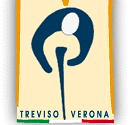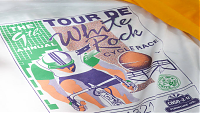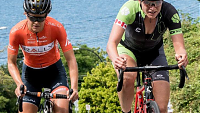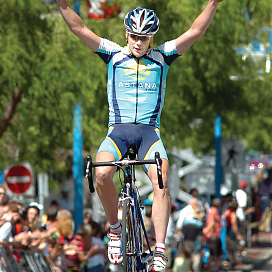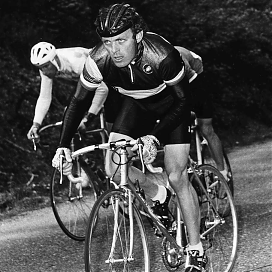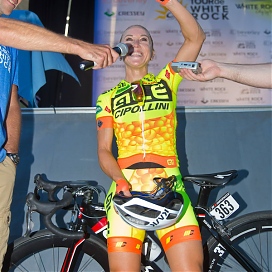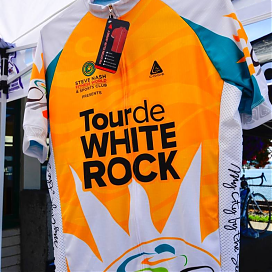Founder's fortitude key to Tour

Alfred Anderson reflects on event’s auspicious beginnings

A bike race, more specifically – similar to ones he’d seen in Europe, and one which would bring the best cyclists to the picturesque, rolling hills of White Rock.
In turn, he hoped it would cause hundreds – maybe one day thousands – of spectators to flock to Marine Drive, where the race would begin and end.
So, full of enthusiasm, a 32-year-old Anderson marched into city hall and pitched his idea, which would be called the Tour de White Rock, cribbing the name from the world famous cycling race in France.
He didn’t get past the lobby.
“No;’ he remembers a woman at the front desk saying. “That doesn’t sound like a good idea – that would never work in White Rock.’
Anderson returned home dejected, but refused to give up. Instead, he sought the advice of Hans Stieda, then-secretary of the B.C. Cycling Association and father of famed Canadian cyclist, Alex.
Stieda encouraged him to keep after it. It was a good idea, he said, considering there were no road races in Western Canada at the time.
“Without Hans’ encouragement, this race probably would never have happened;’ Anderson said, leaning against his bike on Marine Drive, just a few steps away from the Tour de White Rock’s start/finish line.
Eventually, Anderson, who grew up in Louisiana and California before moving to White Rock in the early 1970s, caught the ear of Doug Stone, White Rock’s parks and recreation director at the time, and was allowed to make his presentation to council.
Anderson’s original route – from Crescent Beach to White Rock and back was altered to stay within the boundaries of White Rock, and the idea was officially off the ground, with Labour Day weekend of 1980 pencilled in as the start date.
“Doug told me that I could go ahead and plan it, but that he didn’t have any money for me in the budget;’ Anderson recalled.
“I don’t remember exactly what our budget was for that first race, but I know that it all came directly out of the pocket of me and my ex-wife.’
Prizes came from Henry Vickers, owner of White Rock Sport and Cycle, Anderson added.
“Henry was behind us 100 per cent, even though nobody else really knew anything about cycling at the time.”
For Anderson, who has watched every Tour de White Rock since, and still volunteers at many of them, that first race still ranks as his favourite, despite a number of obstacles.
For starters, he had just nine volunteers – he still remembers each by name – and the weather didn’t exactly co-operate, either.
“It was pouring rain. Very wet and very cold.’ he remembered.
It was so wet, in fact, the Sept. 3 issue of the Peace Arch News that year referred to the rain-soaked affair as the “Tour de Pacific Ocean“.
Paul Tettamanti won the first race, which had more than 40 racers.
Initial troubles aside, Anderson never doubted the event would be a success.
I always knew it would last.’ he said. “I just knew it.’
He had been an avid cyclist nearly his entire adult life, having picked up a love for the sport while attending San Francisco State University in the 1960s. His first race – up and down the gruelling hills of the Golden Gate City – was a university-organized venture, and he was hooked.
He brought his enthusiasm for cycling north at the urging of his college roommate, a Vancouver native. So in 1969, while on his way to the famed Woodstock Festival, Anderson came to Vancouver for a visit. While in town, they travelled to White Rock for fish and chips, and that’s when Anderson thought he might stay awhile.
“I was sitting down on the beach with my friends and just fell in love with the place, and decided this is where I wanted to live. Now I’ve been here more than half my life.’ he said. “Back then, when I told my mom I was moving to Canada, she cried for days.
“In the ’60s, people down in the States didn’t know too much about Canada. They thought as soon as you got to the border it was just ice and parkas after that. But once my parents came for a visit, they were impressed.”
Anderson raised two children here – Joanne and Alfred III – and worked at CP Air for 22 years.
His job afforded him the opportunity to travel, which is where the original seed was planted for the Tour de White Rock.
“I’d see all the European races when I was over there, and I just thought it would work here.’ he said.
It has worked wonderfully, of course, and Anderson chuckles now when thinking back to that soggy Labour Day in 1980.
“We actually almost cancelled it on race day,” he admitted. “It was raining so hard, so I called Doug at 5:30 in the morning and said, ‘I don’t think we should do it. It’s too wet, too cold.”
“I called Hans too, and he said,‘Alfred, the cyclists are already on their way. You can’t cancel – you have to run it, and it’s got to be today. If you cancel it now, they’ll never come back.’
“It was a good thing I listened to him.”
——————————-
Nick Greenizan
Sports Reporter
Friday, July 17, 2009
Peace Arch News
(courtesy White Rock Museum & Archives)

